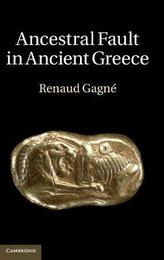
|
Ancestral Fault in Ancient Greece
Hardback
Main Details
| Title |
Ancestral Fault in Ancient Greece
|
| Authors and Contributors |
By (author) Renaud Gagne
|
| Physical Properties |
| Format:Hardback | | Pages:564 | | Dimensions(mm): Height 235,Width 157 |
|
| ISBN/Barcode |
9781107039803
|
| Classifications | Dewey:938 |
|---|
| Audience | | Professional & Vocational | |
|---|
|
Publishing Details |
| Publisher |
Cambridge University Press
|
| Imprint |
Cambridge University Press
|
| Publication Date |
7 November 2013 |
| Publication Country |
United Kingdom
|
Description
Ancestral fault is a core idea of Greek literature. 'The guiltless will pay for the deeds later: either the man's children, or his descendants thereafter', said Solon in the sixth century BC, a statement echoed throughout the rest of antiquity. This notion lies at the heart of ancient Greek thinking on theodicy, inheritance and privilege, the meaning of suffering, the links between wealth and morality, individual responsibility, the bonds that unite generations and the grand movements of history. From Homer to Proclus, it played a major role in some of the most critical and pressing reflections of Greek culture on divinity, society and knowledge. The burning modern preoccupation with collective responsibility across generations has a long, deep antecedent in classical Greek literature and its reception. This book retraces the trajectories of Greek ancestral fault and the varieties of its expression through the many genres and centuries where it is found.
Author Biography
Renaud Gagne is a University Lecturer in Classics at the University of Cambridge and a Fellow of Pembroke College, Cambridge. His main research interests are early Greek poetry and Greek religion. He is a co-editor of Choral Mediations in Greek Tragedy (Cambridge, 2013) and Sacrifices humains. Perspectives croisees et representations (2013).
Reviews"A learned, wide-ranging, and original book. Everyone should read it who is interested in Greek ethics, or symposiastic poetry, or Greek political debates about pollution, or tragedy, or Herodotus, or Greek theology in the imperial period." Ruth Scodel, Bryn Mawr Classical Review
|